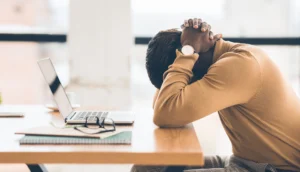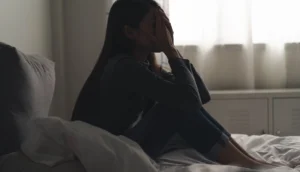Are you trying to figure out how to know if you have depression? Look for signs like chronic sadness, loss of interest in things you once enjoyed, and changes in sleep or appetite. This article will help you identify these symptoms and know when to seek professional help.
Key Takeaways
- Depression is a serious mental health condition characterized by prolonged sadness, affecting daily functioning and requiring early recognition for effective treatment.
- Common signs of depression include persistent low mood, irritability, appetite changes, cognitive difficulties, and various physical symptoms, which can differ across age groups and genders.
- Seeking professional help is crucial when symptoms persist, and self-evaluation tools can aid in recognizing depression, highlighting the importance of accurate diagnosis and comprehensive treatment options.
Understanding Depression
Depression is characterized by prolonged sadness that disrupts normal daily activities. Unlike general sadness, which is a natural reaction to life events, depression is a severe mental health condition that affects one’s ability to work, study, eat, sleep, and enjoy life. Specific symptoms distinguish clinical depression from general sadness, making it essential to recognize the signs early on. Many people who experience these symptoms may feel sad.
Depression does not discriminate; it affects people of all ages, sexes, races, and backgrounds. In the United States alone, approximately 16 million adults experience depression annually. This condition can interfere with every aspect of life, leading to severe consequences if left untreated. Common feelings associated with depression include hopelessness, helplessness, and a pervasive sense of emptiness, which can make a person experiencing feel hopeless.
The causes of depression are multifaceted, involving genetic, environmental, and psychological factors. Traumatic events or significant life changes can heighten the risk of developing depression. Additionally, chronic illnesses such as diabetes, cancer, and heart disease often coexist with depression, further complicating the individual’s health and well-being.
Common Signs and Symptoms of Depression
Depression symptoms vary widely but often include persistent sadness, irritability, and changes in sleep or appetite. People with depression frequently experience symptoms of a low mood and persistent feelings of sadness, emptiness, or hopelessness, which are indicative of a major depressive disorder and a major depressive episode. These emotional symptoms are often accompanied by a loss of interest and losing interest in previously enjoyable activities, leading to social withdrawal, a decline in overall quality of life, and feeling tired. Additionally, understanding the depression benefit can help in addressing these challenges.
Behavioral changes, such as irritability and angry outbursts, even over minor issues, are common signs of depression. Individuals may also experience fatigue and a noticeable decrease in energy levels, making it difficult to complete everyday tasks. Appetite changes, whether reduced eating or increased appetite, can also signal the presence of depression. These symptoms often contribute to a vicious cycle, exacerbating the individual’s emotional distress.
Cognitive symptoms, such as trouble concentrating and making decisions, are prevalent among those suffering from depression. People with depression may struggle with negative thoughts, feelings of guilt, worthlessness, or self-blame, which can further deepen their depressive state. Recognizing these signs and symptoms is crucial for seeking appropriate depression treatment and improving mental health outcomes.
Physical Symptoms of Depression
Depression can manifest through various physical symptoms, making it a complex condition to diagnose and treat. Common physical manifestations include chronic pain, headaches, stomachaches, physical aches, and a racing heart. These symptoms are often unexplained by other medical conditions and other symptoms, suggesting a strong link between physical problems, physical ailments, and mental health.
The presence of multiple physical symptoms increases the likelihood of a mood disorder diagnosis among patients with mental disorders. For instance, frequent headaches, digestive issues, and chronic aches and pains are common complaints among those experiencing depression and bipolar disorder. These health problems can be debilitating, further affecting the individual’s ability to function and maintain a normal lifestyle.
Treating both the physical and emotional symptoms of depression often requires a comprehensive approach. Dual-action antidepressants that influence serotonin and norepinephrine levels may be more effective for treating both physical symptoms and depression. Recognizing and addressing these physical symptoms is crucial for improving overall mental health and ensuring a holistic approach to depression treatment.
Recognizing Depression in Different Age Groups
Depression does not present the same way across all age groups. Children, teenagers, and older adults exhibit different symptoms, making it essential to understand these variations for accurate diagnosis and treatment.
Children, for example, may show depressive symptoms through behavioral changes rather than expressing sadness directly. Young people often express their depression through irritability and anger rather than sadness.
Older adults, on the other hand, may exhibit depression through increased complaints about physical health, such as chronic pain or fatigue. Recognizing these age-specific signs of depression is crucial for providing appropriate support and treatment.
Children
Children with depression may exhibit clinginess towards caregivers or significant adults in their lives. This clinginess can manifest as a reluctance to go to school or participate in activities they once enjoyed. Unlike adults, children may not have the vocabulary to express their feelings, making behavioral changes a critical indicator of depression.
Specific signs of depression in children include:
- Excessive crying
- Social withdrawal
- Changes in appetite
- Changes in sleep
Recognizing these symptoms early and providing the necessary support can significantly improve the child’s mental health and overall well-being.
Teens
Teenagers often exhibit depression through irritability, anger, and increased agitation. These emotional outbursts can be misinterpreted as typical teenage behavior, making it challenging to recognize depression. Physical complaints, such as headaches and stomachaches, are also common among depressed teens.
Risky behaviors, such as substance abuse, are another indication of depression in teenagers. Addressing these symptoms and providing appropriate mental health support is crucial for helping teens navigate this challenging period and improving their overall well-being.
Older Adults
Older adults often express depression through increased complaints about physical health, such as chronic pain or fatigue. Chronic pain conditions are significantly linked to prolonged depressive episodes, with those in pain remaining depressed for longer. These physical complaints can mask the underlying depression, making it essential to consider mental health when addressing chronic pain in older adults.
Neglect of personal appearance or failure to take important medications are additional signs of depression in older adults. Recognizing these symptoms and providing appropriate support can significantly improve the mental health and quality of life for older adults.

Gender Differences in Depression Symptoms
Depression symptoms can manifest differently between men and women, making it essential to understand these differences for effective diagnosis and treatment. Men often express their depression through irritability and anger, which can lead to reckless behavior and substance abuse as coping mechanisms. Recognizing these symptoms in men is crucial for seeking proper help and intervention.
Women, on the other hand, may experience different emotional symptoms, including feelings of guilt and excessive sleeping. Understanding these gender differences is critical for recognizing and treating depression effectively in both men and women.
Men
Common symptoms experienced by depressed men include:
- Fatigue
- Irritability
- Sleep problems
- Loss of interest
- Anger
- Aggression
- Reckless behavior
- Substance abuse
These symptoms can significantly impact a man’s ability to function and maintain relationships. Men often express their depression through anger and aggression, which can lead to reckless behavior and substance abuse as coping mechanisms.
Recognizing these symptoms in men is crucial for seeking proper help and intervention. Addressing these symptoms early can prevent further complications and improve the individual’s mental health and overall well-being.
Women
Common symptoms of depression in women include:
- Guilt
- Excessive sleeping
- Overeating
- Weight gain
These symptoms can significantly impact a woman’s daily life and overall mental health. Understanding these gender-specific symptoms is crucial for providing effective support and treatment.
Women may also experience depressive episodes related to hormonal changes, such as postpartum depression or menopause. Recognizing these symptoms and providing appropriate support can improve the mental health and quality of life for women.
When to Seek Professional Help
If signs or symptoms of depression persist or do not go away, it is important to talk to a healthcare provider. Anyone who thinks they may have depression should consult a healthcare provider, especially if symptoms last longer than two weeks. Suicidal thoughts or behaviors should always be taken seriously and require immediate professional help.
Untreated depression can become a serious health condition, impacting every aspect of life. If you are feeling suicidal or may attempt suicide, it is crucial to reach out for help immediately. You can visit the NIMH website or use SAMHSA’s online tool to find help for depression and connect with a crisis lifeline.
Self-Evaluation Tools for Depression
Quizzes and self-assessment tools are valuable for individuals to recognize potential symptoms of depression. Mental health professionals may use standardized questionnaires to assess symptoms and aid in the diagnosis of depression. The Beck Depression Inventory (BDI) comprises 21 questions that assess various aspects of depression, such as feelings of guilt and physical symptoms.
The Quick Inventory of Depressive Symptomatology-Self-Report (QIDS-SR) is designed for adults and takes about 5-7 minutes to complete, evaluating symptom severity. The Zung Self-Rating Depression Scale (SDS) uses 20 items to measure depression severity, with respondents rating their symptoms on a 1 to 4 scale.
Utilizing these self-evaluation tools can serve as a first step towards recognizing the need for professional help regarding depression.
The Importance of Proper Diagnosis
Accurate diagnosis of depression is crucial as it can overlap with several other mental health disorders, impacting treatment effectiveness. The DSM-5 provides specific criteria that mental health professionals refer to when diagnosing depression, ensuring a standard approach. The Hamilton Rating Scale for Depression (HAM-D) helps clinicians assess the seriousness of depressive symptoms and is essential in professional settings.
Accurate diagnosis often requires a physical examination and potentially lab tests to rule out underlying health issues that may mimic depression symptoms. Certain physical health conditions, such as hormonal imbalances or chronic illnesses, can present symptoms similar to depression, complicating the diagnosis.
Treatment Options for Depression
Common treatment options for depression include:
- Psychotherapy, which is used to help people with depression and can be delivered in one-on-one or group sessions, including virtually through telehealth, such as talk therapy
- Medication, specifically antidepressants, which are typically prescribed for moderate to severe depression
- Brain stimulation therapy
Brain stimulation therapy, such as Electroconvulsive Therapy (ECT) and repetitive transcranial magnetic stimulation (rTMS), may be necessary if initial treatments do not sufficiently reduce symptoms. Lifestyle changes, such as engaging in activities that bring joy, along with therapies like Acceptance and Commitment Therapy, can improve mood during depressive episodes. Some natural products may inconsistently help with depression symptoms, but it’s important to consult a health care provider before use.
Back Bay Mental Health offers various depression treatments in Boston, including intensive outpatient programs, flexible scheduling, and personalized therapy approaches.
How Back Bay Mental Health Can Help
Located in Boston’s Back Bay, the center is easily accessible via public transportation, making it convenient for clients commuting from various areas. Back Bay Mental Health is a therapy and mental health facility that provides nuanced support through therapy and medication management for individuals struggling with depression.
The center offers comprehensive treatment solutions, including individual therapy, group sessions, and medication management. By providing personalized care, Back Bay Mental Health aims to help clients achieve better mental health and improve their quality of life through mental health services administration.
Understanding the signs and symptoms of depression is essential for recognizing when you or a loved one might need help. Depression impacts millions of people, affecting their ability to enjoy life and maintain daily activities. By identifying common emotional and physical symptoms, and recognizing how depression manifests differently across age groups and genders, we can better support those in need.
Seeking professional help is crucial if symptoms persist, and utilizing self-evaluation tools can be a valuable first step in this process. Proper diagnosis and treatment, including psychotherapy, medication, and lifestyle changes, are essential for managing depression effectively. Remember, Back Bay Mental Health is here to provide comprehensive support and treatment options for individuals struggling with depression, helping them achieve better mental health and overall well-being.
Frequently Asked Questions
What are the most common signs of depression?
The most common signs of depression are persistent sadness, irritability, changes in sleep or appetite, loss of interest in previously enjoyed activities, feelings of guilt or worthlessness, and difficulty concentrating. Recognizing these symptoms is crucial for seeking help.
How does depression manifest physically?
Depression often presents with physical symptoms including chronic pain, headaches, stomachaches, and a racing heart. Recognizing these manifestations is crucial for effective management and support.
How do depression symptoms differ between men and women?
Depression symptoms often differ between men and women, with men typically displaying irritability, anger, and a tendency towards substance abuse, whereas women may experience guilt, excessive sleeping, overeating, and weight gain. Understanding these differences can aid in more effective diagnosis and treatment.
When should someone seek professional help for depression?
You should seek professional help for depression if symptoms persist for more than two weeks or if you experience suicidal thoughts or behaviors. Prompt intervention is crucial for your well-being.
What treatment options are available for depression?
Treatment options for depression encompass psychotherapy, medication, brain stimulation therapy, lifestyle modifications, and professional support. Each of these methods can effectively contribute to managing and alleviating symptoms of depression.




